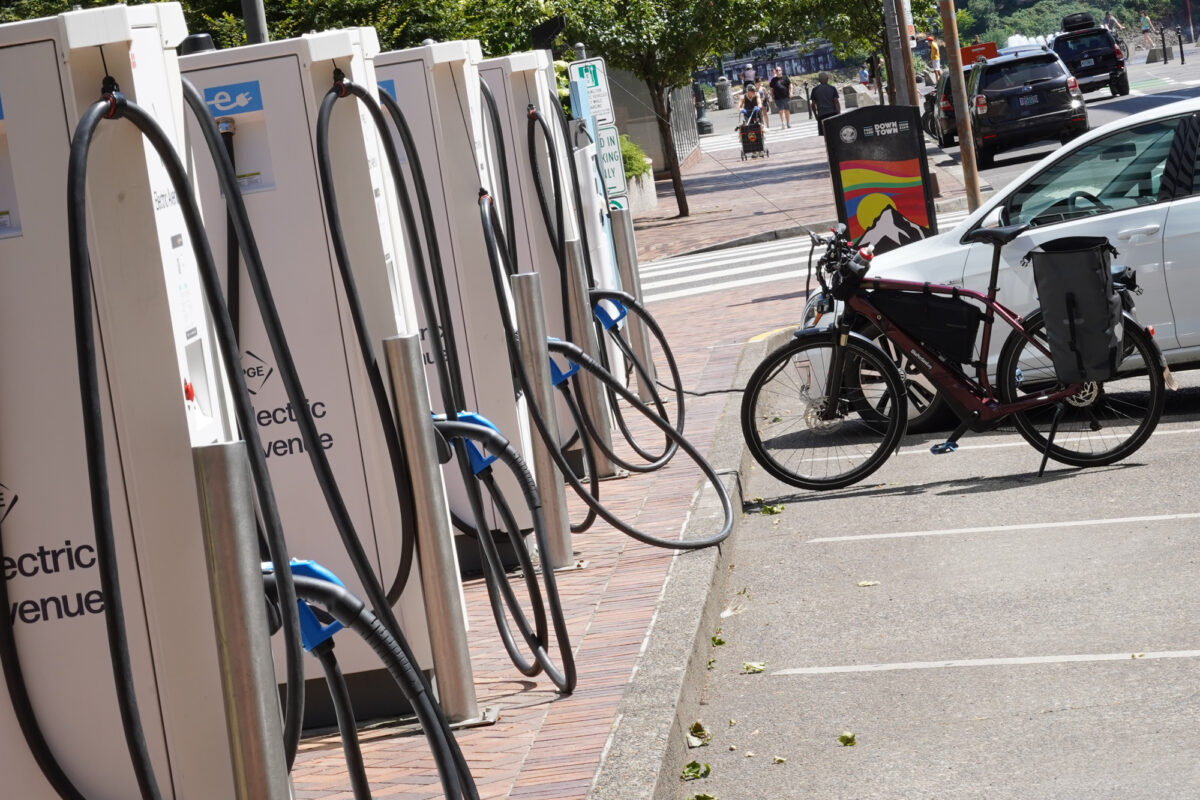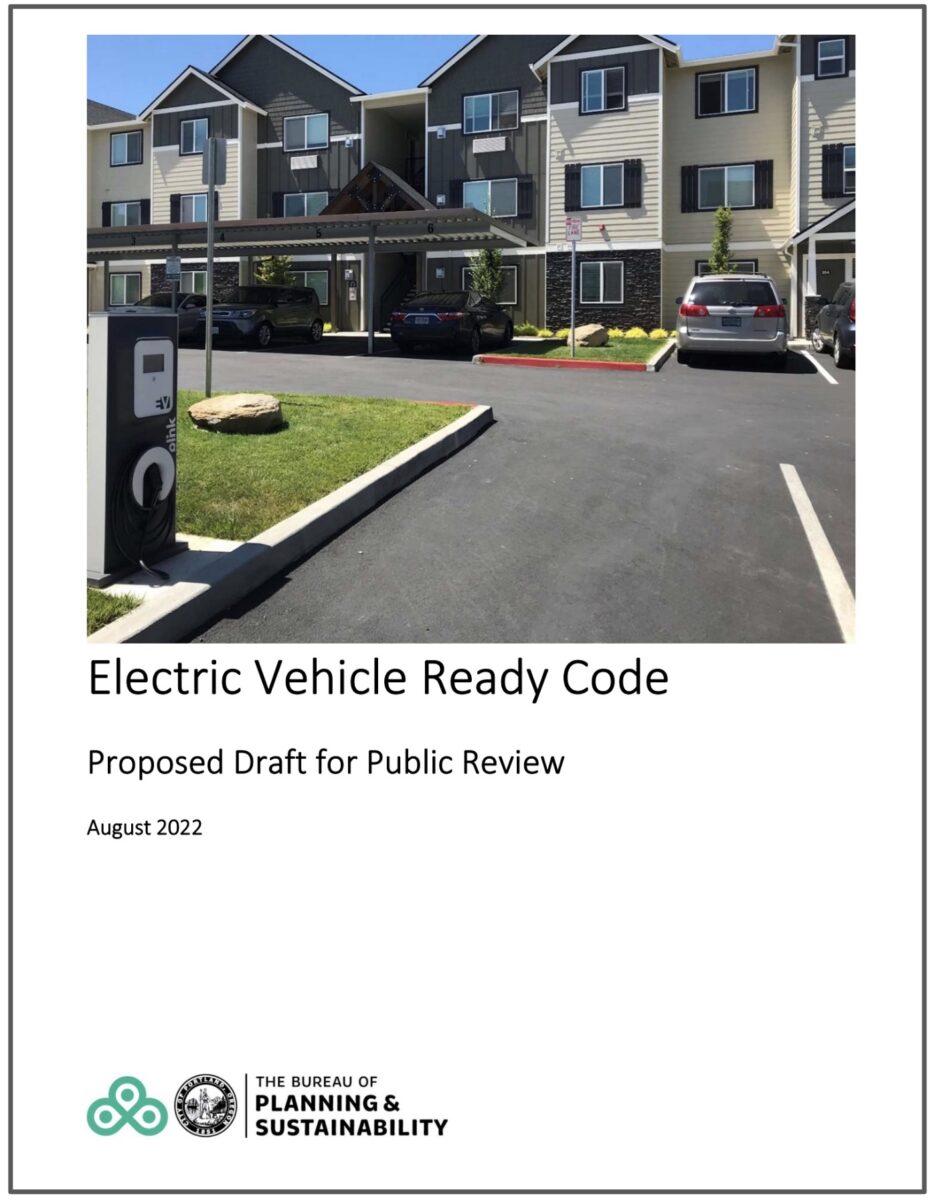
Last week, the Portland Bureau of Planning and Sustainability (BPS) released a new draft proposal for its Electric Vehicle Ready Code project, which would amend city zoning code to require electric vehicle charging at new multi-unit dwellings. But advocates for electric bikes – who frequently lament being left out of efforts to expand electric vehicle usage – will notice bikes are missing from the equation yet again.
As we pointed out when we looked at the discussion draft for this code amendment back in May, the plan acknowledges there is a need for alternative forms of transport, like electric bikes, to substitute for car trips in order for the city to meet its climate goals.
“Fundamentally, the number of private vehicles must decrease, the distance travelled must shrink, and alternative forms of electric transport (including electric buses, electric- scooters and electric bikes) must substitute for car trips,” the document states.
But that’s where the conversation ends. Neither the discussion draft nor the most recent draft proposal provides a plan for less private vehicle ownership and more e-bike usage through added charging facilities.
Even with tax credits for electric cars, these vehicles can be prohibitively expensive for broad adoption. And although they’re certainly better for the environment than cars that burn gasoline, e-cars have their pitfalls. E-bikes can serve as transformative, climate-friendly car replacements – but only if people can easily use them.
The crux of the plan is to require new multi-unit and mixed use developments with five or more units to provide the conduit for electric car charging infrastructure at 100% of parking spaces if the complex provides six spaces or less, or 50% of spaces when more than six are provided. The amendment won’t require developments to include parking spaces – but if they do, they need to follow these rules.
The lack of access to charging facilities for all electric vehicles – cars and bikes – impacts people of color and people who make low-incomes the most. As such, this impedes on the city’s equity goals, which is something they’re trying to tackle with this amendment.
“Access to EV-charging facilities in multifamily housing is key to ensuring equitable access,” the document states. “Renters…represent a greater portion of low- and moderate-income and Black, Indigenous, and People of Color (BIPOC) households. To date, these households have largely been unable to benefit from electric vehicles.”
“It’s kind of ridiculous that we’re bending over backwards to support cars but we’re not doing anything for e-bikes when the environmental benefits of e-bikes are so high.”
– Chris Smith
It’s true that people who live in multi-unit dwellings have a more difficult time accessing charging facilities for electric vehicles. But the logic applied to electric cars in the draft document, which states the “adoption of electric vehicle use is slowed by lack of familiarity and concerns about the availability of charging infrastructure,” also applies to electric bikes.
People who live in apartment or condo complexes may not be able to lug their bike to their unit to charge it if the battery isn’t removable, and the bikes can take up a lot of space in a small home. Having accessible charging infrastructure would make e-bikes easier to use for a lot of people.
It’s worth asking if e-bike owners would actually use charging facilities if they were provided alongside e-car charging in multi-unit dwellings. Portland’s major 2019 bike parking reform made it a requirement for bike parking – and outlets – to be included in many new multi-unit dwelling developments, so people should have access to more optimal places to charge them than in a parking lot with questionable security. But e-bike charging infrastructure needs deserve the level of attention electric car charging receives, so advocates say they should at least be included in the discussion for policies like this.
“My reaction is that it’s disappointing and kind of ridiculous that we’re bending over backwards to support cars but we’re not doing anything for e-bikes when the environmental benefits of e-bikes are so high,” Chris Smith, a Portland transportation activist and former member of the Planning and Sustainability Commission, told me.
People who use e-bikes as their primary means of transportation often need to get creative with charging solutions. The Oregon Department of Transportation has outfitted new electric vehicle charging stations with e-bike charging capacity, which is a small step toward e-bike accessibility, but does nothing to help bring easier charging closer to where people live.
Beyond the infrastructure itself, any time we update city code it’s an opportunity for government to send a message that they support and encourage non-car transportation, which in turn impacts whether or not the population at-large views e-bikes as a viable car alternative.
The next step in adopting this plan will be a BPS hearing on September 13, which will be open for public testimony. You can register to testify at the draft hearing here.




